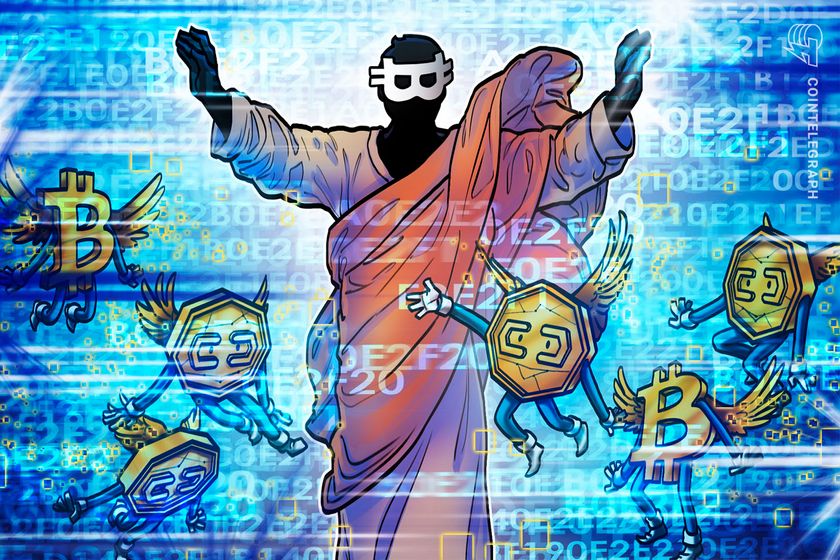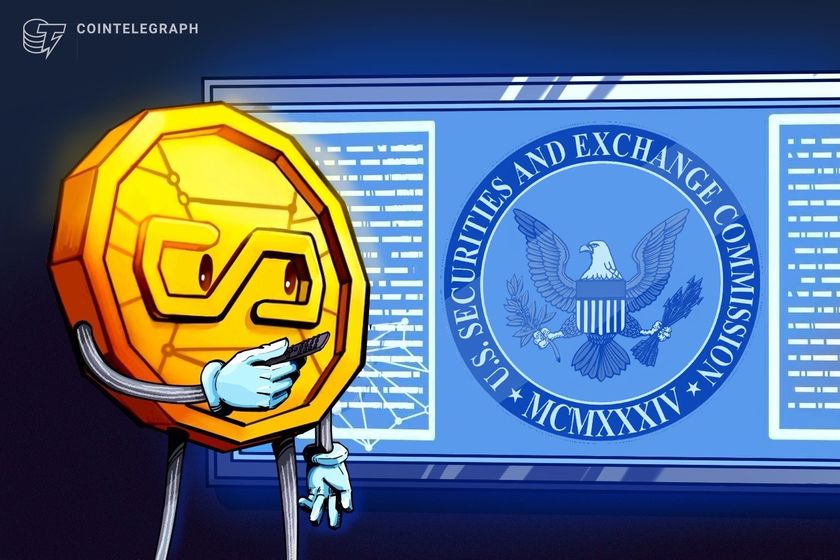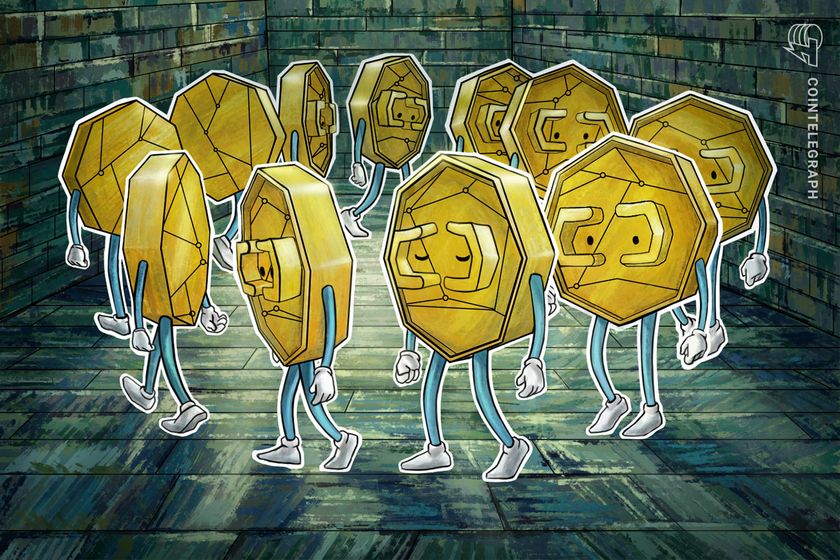
by Cointelegraph by Zoltan Vardai | 5 Apr 2025 | Crypto Law |
Satoshi Nakamoto, the pseudonymous creator of Bitcoin, marks their 50th birthday amid a year of rising institutional and geopolitical adoption of the world’s first cryptocurrency.The identity of Nakamoto remains one of the biggest mysteries in crypto, with speculation ranging from cryptographers like Adam Back and Nick Szabo to broader theories involving government intelligence agencies.While Nakamoto’s identity remains anonymous, the Bitcoin (BTC) creator is believed to have turned 50 on April 5 based on details shared in the past. According to archived data from his P2P Foundation profile, Nakamoto once claimed to be a 37-year-old man living in Japan and listed his birthdate as April 5, 1975.Source: Web.archive.orgNakamoto’s anonymity has played a vital role in maintaining the decentralized nature of the Bitcoin network, which has no central authority or leadership.The Bitcoin wallet associated with Nakamoto, which holds over 1 million BTC, has laid dormant for more than 16 years despite BTC rising from $0 to an all-time high above $109,000 in January.Satoshi Nakamoto statue in Lugano, Switzerland. Source: CointelegraphNakamoto’s 50th birthday comes nearly a month after US President Donald Trump signed an executive order creating a Strategic Bitcoin Reserve and a Digital Asset Stockpile, marking the first major step toward integrating Bitcoin into the US financial system.Related: Bitcoin at 16: From experiment to trillion-dollar assetNakamoto’s legacy: a “cornerstone of economic sovereignty”“At 50, Nakamoto’s legacy is no longer just code; it’s a cornerstone of economic sovereignty,” according to Anndy Lian, author and intergovernmental blockchain expert.“Bitcoin’s reserve status signals trust in its scarcity and resilience,” Lian told Cointelegraph, adding: “What’s fascinating is the timing. Fifty feels symbolic — half a century of life, mirrored by Bitcoin’s journey from a white paper to a trillion-dollar asset. Nakamoto’s vision of trustless, peer-to-peer money has outgrown its cypherpunk roots, entering the halls of power.”However, lingering questions about Nakamoto remain unanswered, including whether they still hold the keys to their wallet, which is “a fortune now tied to US policy,” Lian said.Related: Bitcoin’s next catalyst: End of $36T US debt ceiling suspensionIs Satoshi Nakamoto wealthier than Bill Gates?In February, Arkham Intelligence published findings that attribute 1.096 million BTC — then valued at more than $108 billion — to Nakamoto. That would place him above Microsoft co-founder Bill Gates on the global wealth rankings, according to data shared by Coinbase director Conor Grogan.Satoshi’s new addresses. Source: Conor GroganIf accurate, this would make Nakamoto the world’s 16th richest person.Despite the growing interest in Nakamoto’s identity and holdings, his early decision to remain anonymous and inactive has helped preserve Bitcoin’s decentralized ethos — a principle that continues to define the cryptocurrency to this day.Magazine: 10 crypto theories that missed as badly as ‘Peter Todd is Satoshi’

by Cointelegraph by Ciaran Lyons | 5 Apr 2025 | Crypto Law |
The United States stock market lost more in value over the April 4 trading day than the entire cryptocurrency market is worth, as fears over US President Donald Trump’s tariffs continue to ramp up.On April 4, the US stock market lost $3.25 trillion — around $570 billion more than the entire crypto market’s $2.68 trillion valuation at the time of publication.Nasdaq 100 is now “in a bear market”Among the Magnificent-7 stocks, Tesla (TSLA) led the losses on the day with a 10.42% drop, followed by Nvidia (NVDA) down 7.36% and Apple (AAPL) falling 7.29%, according to TradingView data.The significant decline across the board signals that the Nasdaq 100 is now “in a bear market” after falling 6% across the trading day, trading resource account The Kobeissi Letter said in an April 4 X post. This is the largest daily decline since March 16, 2020.”US stocks have now erased a massive -$11 TRILLION since February 19 with recession odds ABOVE 60%,” it added. The Kobessi Letter said Trump’s April 2 tariff announcement was “historic” and if the tariffs continue, a recession will be “impossible to avoid.”Source: Anthony ScaramucciOn April 2, Trump signed an executive order establishing reciprocal tariffs on trading partners and a 10% baseline tariff on all imports from all countries. Trump said the reciprocal tariffs will be roughly half the rate US trading partners impose on American goods.Related: Bitcoin bulls defend $80K support as ‘World War 3 of trade wars’ crushes US stocksMeanwhile, the crypto industry has pointed out that while the stock market continues to decline, Bitcoin (BTC) remains stronger than most expected.Crypto trader Plan Markus pointed out in an April 4 X post that while the entire stock market “is tanking,” Bitcoin is holding. Source: Jeff DormanEven some crypto skeptics have pointed out the contrast between Bitcoin’s performance and the US stock market during the recent period of macro uncertainty.Stock market commentator Dividend Hero told his 203,200 X followers that he has “hated on Bitcoin in the past, but seeing it not tank while the stock market does is very interesting to me.”Meanwhile, technical trader Urkel said Bitcoin “doesn’t appear to care one bit about tariff wars and markets tanking.” Bitcoin is trading at $83,749 at the time of publication, down 0.16% over the past seven days, according to CoinMarketCap data.Magazine: XRP win leaves Ripple a ‘bad actor’ with no crypto legal precedent set

by Cointelegraph by Ciaran Lyons | 5 Apr 2025 | Crypto Law |
US Securities and Exchange Commission (SEC) Commissioner and vocal crypto critic Caroline Crenshaw has accused the US regulator of downplaying risks and misrepresenting the US stablecoin market in its newly published guidelines.However, many in the crypto industry see the SEC’s decision as a step in the right direction.In an April 4 statement, Crenshaw, who is widely known for opposing the spot Bitcoin ETFs, said that the SEC’s statement on stablecoins contained “legal and factual errors that paint a distorted picture of the USD-stablecoin market that drastically understates its risks.”Crenshaw disagrees, crypto industry applaudsUnder the new SEC guidelines, stablecoins that meet certain criteria are now considered “non-securities” and are exempt from transaction reporting requirements. Crenshaw disputed the accuracy of the analysis made by the SEC in arriving at that decision. She pushed back on the SEC for reiterating issuer actions “that supposedly stabilize price, ensure redeemability, and otherwise reduce risk.”Source: David SacksThe SEC said that “albeit briefly, that some USD-stablecoins are available to retail purchasers only through an intermediary and not directly from the issuer.”Crenshaw argued this was misleading. She said:”It is the general rule, not the exception, that these coins are available to the retail public only through intermediaries who sell them on the secondary market, such as crypto trading platforms.””Over 90% of USD-stablecoins in circulation are distributed in this way,” Crenshaw added.Meanwhile, many in the crypto industry expressed optimism over the decision.Token Metrics founder Ian Ballina said it “feels like a clear step in focusing on what really matters in the crypto space.” Crypto industry says positive step, just lateVemanti CEO Tan Tran said he wished the SEC reached this point three years ago, while Midnight Network’s head of partnerships Ian Kane said it “feels like progress for crypto folks trying to play by the rules.”Crenshaw said it is “also grossly inaccurate” for the SEC to reassure users that an issuer can handle unlimited redemptions just because its reserves match or exceed the value of the supply.Related: Stablecoins’ in bull market’; Solana sputters: VanEck”The issuer’s overall financial health and solvency cannot be judged by the value of its reserve, which tells us nothing about its liabilities, risk from proprietary financial activities, and so forth,” Crenshaw said.She explained that stablecoins always carry some risk, particularly during market downturns.It comes only weeks after stablecoin issuer Tether was reportedly engaging with a Big Four accounting firm to audit its assets reserve and verify that its USDT stablecoin is backed at a 1:1 ratio.On March 22, Cointelegraph reported that Tether CEO Paolo Ardoino said the audit process would be more straightforward under pro-crypto US President Donald Trump.Magazine: XRP win leaves Ripple a ‘bad actor’ with no crypto legal precedent set

by Cointelegraph by Vince Quill | 5 Apr 2025 | Crypto Law |
Under new SEC guidelines, stablecoins that meet certain criteria are considered ”non-securities” and are exempt from transaction reporting requirements, the United States Securities and Exchange Commission said in a notice published April 4. “Covered stablecoins,” as the SEC classifies them, are fully backed by physical fiat reserves or short-term, low-risk, highly liquid instruments and are redeemable at a 1:1 ratio with US dollars.The definition precludes algorithmic stablecoins that maintain their US dollar peg using software or an automated trading strategy, leaving the regulatory status of algorithmic stablecoins, synthetic dollars, and yield-bearing fiat tokens uncertain.Current stablecoin market overview. Source: RWA.XYZIndustry leaders and executives are pushing for regulatory changes that would allow stablecoin issuers to share yield opportunities with stablecoin holders and offer onchain interest.According to the new guidelines, covered stablecoin issuers cannot co-mingle asset reserves with operational capital or offer token holders interest, profit, or yield opportunities. Additionally, the covered stablecoin issuers must never use their reserves for investing or market speculation.Related: Stablecoin supply surges $30B in Q1 as investors hedge against volatilitySEC’s definition of “covered stablecoin” consistent with broader US policy objectivesThe SEC’s criteria for covered stablecoins are consistent with regulations stipulated in the GENIUS stablecoin bill, introduced by Senator Bill Hagerty, and the Stable Act of 2025, introduced by Representative French Hill.The proposed legislation aims to protect the status of the US dollar as the global reserve currency through stablecoins that are backed by US dollars and government securities.The Guiding and Establishing National Innovation for US Stablecoins (GENIUS) of 2025 Act. Source: US SenateCentralized stablecoin issuers back their tokens with US dollar deposits held in regulated financial institutions and short-term US Treasury Bills, driving demand for US dollars and US government debt.Tether, the world’s largest stablecoin issuer, is now the seventh-largest holder of US Treasuries, beating out countries like Canada, Germany, and South Korea.Speaking at the first White House Digital Asset Summit on March 7, US Treasury Secretary Scott Bessent said the US would use stablecoins to extend US dollar dominance.Bessent said that regulating stablecoins was central to the administration’s digital asset strategy and a top regulatory priority during the current legislative session.Magazine: Bitcoin payments are being undermined by centralized stablecoins

by Cointelegraph by Sam Bourgi | 5 Apr 2025 | Crypto Law |
Brazilian judges have been authorized to seize cryptocurrency assets from debtors who owe money and are behind on their payments, signaling a growing recognition that digital assets can be both a form of payment and a store of value.According to local media reports, the Third Panel of Brazil’s Superior Court of Justice unanimously authorized judges to send letters to cryptocurrency brokers informing them about their intent to seize an account holder’s assets to repay creditors.The report was confirmed by the Superior Court of Justice, which issued a notice on its website.The decision was reached unanimously by the Third Panel, which reviewed a case brought forward by a creditor.“Although they are not legal tender, crypto assets can be used as a form of payment and as a store of value,” a translated version of the Superior Court of Justice’s memo read.Source: STJnoticiasUnder existing rules, Brazilian judges are allowed to freeze bank accounts and order fund withdrawals, even without a debtor’s knowledge, should they rule that a creditor is owed money.Following the recent decision, crypto assets now fall under the same purview. Minister Ricardo Villas Bôas Cueva, who voted in the five-person panel, said cryptocurrencies still lack formal regulation in Brazil but noted certain bills have recognized the asset class as “a digital representation of value.” Related: Brazil’s data watchdog upholds ban on World crypto paymentsDespite regulatory uncertainty, Brazil is a major hub for cryptoAlthough Brazil still lacks an overarching framework for digital assets, with the country’s central bank divvying up the regulatory processes into phases, crypto adoption is surging across the country.Brazil ranks second among all Latin American countries in terms of “crypto value received,” which is a key benchmark for adoption, according to an October report by Chainalysis. In Latin America, only Argentina has higher crypto penetration in terms of value received as of June 2024. Source: ChainalysisEarlier this year, crypto exchange Binance was granted approval to operate in the country after it acquired a São Paulo-based investment company. A Binance executive told Cointelegraph at the time that Brazil was making “significant strides” in regulating the industry and expects a comprehensive framework to be finalized “by mid-year.”Nevertheless, not all of Brazil’s regulatory proposals have been favorable for the industry.In December, the country’s central bank proposed banning stablecoin transactions on self-custodial wallets at a time when more locals were using dollar-pegged tokens to hedge against the devaluation of the Brazilian real.Industry observers told Cointelegraph at the time that such a ban would be difficult to enforce.“Governments can regulate centralized exchanges, but P2P transactions and decentralized platforms are much harder to control, which means the ban would likely only affect part of the ecosystem,” said Lucien Bourdon, an analyst with Trezor. Related: Brazilian lawmaker introduces bill to regulate Bitcoin salaries

by Cointelegraph by Alex O’Donnell | 5 Apr 2025 | Crypto Law |
Cryptocurrency firms felt the heat from US President Donald Trump’s sweeping tariff rollout this week as market turbulence sent share prices tumbling and foiled initial public offering (IPO) plans. From exchanges to Bitcoin (BTC) miners, crypto stocks suffered as much, if not more, than shares of other companies — despite the industry’s warm relationship with the US president. On April 2, Trump announced he was placing tariffs of at least 10% on practically all imports into the United States and adding additional “reciprocal” tariffs on some 57 countries. Since then, major US stock indices — including the S&P 500 and Nasdaq — tumbled by roughly 10% as traders braced for a looming trade war. Bitcoin miners sold off on Trump’s tariff news. Source: MorningstarRelated: Bitcoin ‘decouples,’ stocks lose $3.5T amid Trump tariff war and Fed warning of ‘higher inflation’Sharp selloffsCrypto exchange Coinbase — a prominent ally of Trump during the November US elections — experienced a similarly severe sell-off, with its stock price dropping by roughly 12% during the same period, according to data from Google Finance.Bitcoin miners are also taking a hit. The CoinShares Crypto Miners ETF (WGMI) — which tracks a diverse basket of Bitcoin mining stocks — has lost roughly 13% of its value since immediately prior to Trump’s April 2 announcement, according to data from Morningstar. Even Strategy, one of the best-performing stocks of 2024, wasn’t immune. Its share price has fallen by around 6% on the news, Google Finance data showed.According to Reuters, investment bank JPMorgan has raised its estimated odds of a global economic recession in 2025 to 60% from 40% previously. “Disruptive U.S. policies have been recognized as the biggest risk to the global outlook all year,” JP Morgan reportedly said.”The effect … is likely to be magnified through (tariff) retaliation, a slide in U.S. business sentiment and supply-chain disruptions.”Strategy’s shares also dropped this week. Source: Google FinanceIPO delaysThe impact of US tariffs hasn’t been limited to stock price volatility. Stablecoin issuer Circle has reportedly paused plans for a 2025 IPO, citing market turbulence. According to The Wall Street Journal, Circle is “waiting anxiously” before taking further steps after filing to take the company public on April 1. It is among several companies — including fintech Klarna and ticketing service StubHub — reportedly considering altering or shelving IPO plans. One exception may be Bitcoin itself, which some analysts say is finally “decoupling” from the broader market. Bitcoin’s spot price has held above $82,000 this week, even as US equities markets collapsed.Magazine: Unstablecoins: Depegging, bank runs and other risks loom






